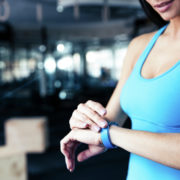What Health Stats Should You be Tracking?
Keeping up with key health data is not only popular right now, but can help you get a better idea of how your body is functioning on a day-to-day basis.
Tracking your sleep patterns or how much sugar you consume can help you visualize the bigger picture. With this information available to you, it’s easier to figure out what you need to do to improve your health.
The best way to track this: with a wearable, also called a fitness tracker. From smart watches to medical-devices, wearables have become increasingly popular for tracking a number of lifestyle stats. A recent analysis revealed that deals can be found both online and offline, with most stores stocking more than 50 percent of the wearables surveyed.
You might be wondering: Okay, so what should I be tracking? Your health depends on sleep, stress, fitness, food and more, so tracking a little of everything can be helpful. If that feels like too much, consider your goals and how tracking the following stats can help you reach them, and then focus on that data alone.
Daily Steps
This is one of the most common uses for wearables because the benefits of staying active on a daily basis are endless. Tracking the number of steps you take is one of the best ways to get an accurate picture of how active you actually are each day.
Health professionals recommend taking 10,000 steps, or walking, jogging or running five miles a day. This amount of daily activity can help you maintain your weight, lower blood pressure levels and improve cardiovascular fitness levels.
If that feels intimidating, start with a goal of 3,000 to 5,000 a day and then slowly work your way up. If your goal is weight loss, aim higher and up the intensity with jogging or running.
The pedometers built in to your wearable device usually sync with the app on your smartphone, making it extremely easy to log your progress each day. For some wearables, there’s even an option to compete with friends and family on the daily number of steps you take, making tracking a lot more fun.
Changes in Heart Rate
Monitoring your heart rate is important for many reasons and now with advanced heart rate tracking technology, it’s easy to do on your own. For some wearables, algorithms in the device measure and record heart rate automatically and continuously. Your resting heart rate, or the rate your heart beats when you are still, can be an indicator of the condition of your heart and overall physical health.
While the average resting heart rate rises with age, it’s typically anywhere from 60-100 beats per minute. This number is generally lower for people who are physically fit because their hearts don’t have to work as hard to process and maintain the flow of oxygen. Check with your health professional to determine what your goal heart rate should be during rest and activity.
Note that whether you are using a smart watch or chest strap, the accuracy of recorded heart rate does depend on personal physiology and type of movement. Movement, stress, medications and different medical conditions can all affect your heart rate so it’s important to keep track and check with your doctor if something doesn’t look right.
Sleep Patterns
Getting enough sleep every night is important for mental clarity, keeping your appetite in check, and warding off depression and stress. The National Sleep Foundation recommends 8 to 10 hours for teenagers and 7 to 9 hours for adults. It’s important to examine what lifestyle factors are affecting the quantity as well as the quality of your sleep and wearable sleep trackers can help you.
According to Prevention, poor sleep cycles usually point to underlying health problems such as depression, latent infection, REM Behavior Disorder, diabetes or even an overactive thyroid. If you have sleep apnea, you could be waking up several times a night and not even know. Your wearable can help you decode your sleeping patterns, by showing you each time you wake up during the night and for how long.
Most wearables also track how long it takes you to fall asleep and how much time you spend in deep sleep—important data to help you decipher what your sleep patterns really mean and whether you’re body is struggling to get enough rest.
Nutrition
Medical studies show that keeping track of the foods you eat each day is the best way to lose weight and keep it off. Many people consume thousands of calories a day without realizing how these foods are adding up. When you see that on your wearable, especially when tracking over time, you become more aware of what you’re consuming, helping you make better choices.
For people with chronic illness such as high blood pressure, heart disease or diabetes, tracking nutrient intake is especially important for optimal health. For example, cholesterol and sugar are in many common foods and without tracking it, it’s easy to over consume, putting you past the recommended daily amount.
Use an app or tracking platform that pairs with your wearable, allowing you to see data at any given moment. This will also allow you to see this progress side-by-side with how many steps you take, how well you’re sleeping and more, giving you a broad and accurate image of the current state of your health.
Tracking all aspects of your health allows you to be more informed about the state of your body on a day-to-day basis and using wearables will help you stay conscious of where you need to improve and where you’re already making progress.
source: www.precor.com



